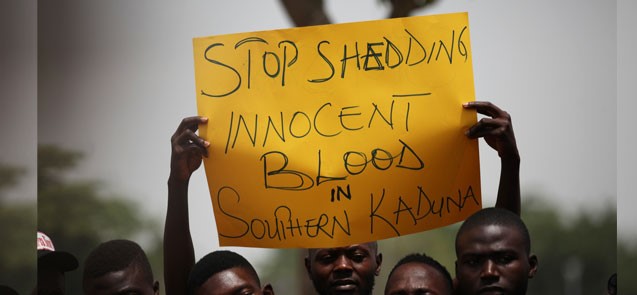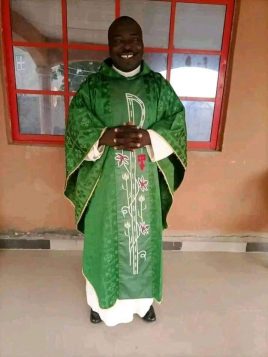
Priests in Nigeria fear for their lives. Hardly a day goes by without news of a new kidnapping. The latest abduction of two diocesan priests occurred on July 15 in the rectory of the Christ the King parish in Yadin Garu, Kaduna State: Father John Mark Cheitnum was killed the same day he was abducted. His dead body was recovered yesterday. The other priest, Father Donatus Cleopas, however, managed to escape from the kidnappers.
 Father John Mark Cheitnum was archpriest of the Kwol deanery, director of communication for Kafanchan diocese and parish priest at St James Church in Jama’a, Kaduna State. His funerals will be celebrated tomorrow, July 21, at 10am at St Peter’s Cathedral, Kafanchan. “While we solicit prayers for the eternal rest of our beloved confrere and for comfort in God’s presence for his family members”, says Father Emmanuel Uchechukwu Okolo, of the diocese of Kafanchan, “we humbly appeal to the population at large to refrain from taking the law into their own hands. The diocese announced a two-day national mourning.
Father John Mark Cheitnum was archpriest of the Kwol deanery, director of communication for Kafanchan diocese and parish priest at St James Church in Jama’a, Kaduna State. His funerals will be celebrated tomorrow, July 21, at 10am at St Peter’s Cathedral, Kafanchan. “While we solicit prayers for the eternal rest of our beloved confrere and for comfort in God’s presence for his family members”, says Father Emmanuel Uchechukwu Okolo, of the diocese of Kafanchan, “we humbly appeal to the population at large to refrain from taking the law into their own hands. The diocese announced a two-day national mourning.
A 64-year-old Italian missionary, Father Luigi Brenna, a Somascan Father, was likewise the victim of a kidnapping attempt on July 3 in his community in Ogunwenyi, in Nigeria’s Edo State. He managed to escape almost miraculously after having been beaten and attacked with a machete. He has now recovered and is back in Italy with his relatives. Figures released a few days ago by Aid to the Church in Need show that 18 priests were abducted in 2022, but according to reports, over 50 priests, most of them Nigerians, were abducted in Nigeria. In a recent statement, the Nigerian Diocesan Catholic Priests Association (NDCPA) declared last week: “it is really sad that in the course of their normal pastoral activities, Priests have become an endangered species.” Indeed, the phenomenon is largely unacknowledged, since many do not even report the facts. SIR interviewed Fr Tobias Chikezie Ihejirika, a confrere of Fr Brenna and the first Nigerian Somascan priest. The two priests have a close connection since they lived in the same community for four years in Benin city.
“Father Luigi showed great courage because he resisted,” says Father Tobias Chikezie Ihejirika. He told his captors: “Kill me if you want, but I will not come with you. Since they could not get him to walk, they beat him and left him lying on the ground, presuming he was dead. He was blessed. He is a man of compassion and joy.”
Mistreated by the abductors. Father Tobias knows of four more priests who suffered the terrible experience of kidnapping, either at the hands of thugs or of the dreaded Fulani herdsmen, Muslim armed groups seeking pastures for their cows who fund their activities through kidnapping. “The abducted are treated very badly,” he reports. “They are forced to march through the forest continuously, they never stop.
They sleep outdoors, are given a very small amount of food. Many die as a result of illness and lack of medication. Some have even been raped. When the Church or family members do not pay the ransom or if they recognise one of the kidnappers, they are killed”.
The Somascan priest, from Oweri in Imo State, reports a bizarre story with a happy ending: “A friend of mine was kidnapped by local criminal gangs, who kidnapped also ordinary citizens. When they realised he was a priest, he was released on the condition that he would pray for them. This led to a somewhat comical situation whereby he had to pray and ask for blessings on their behalf.”
Ransoms are reported to range from 5 to 10 million Nigerian Naira (equivalent to between 10,000 and 20,000 Euros) but the Fulani have been requesting more than that lately. The Nigerian Church initially took a firm stance: it would not pay the ransoms, also because we were dealing with common criminals. This strategy worked for a while. Now it is no longer possible, as the abducted persons would most certainly be killed. The dioceses or family members pay the ransom. “Priests are easy targets because they are present in every village,” notes Father Tobias. “They are seen as having a certain degree of economic security, cars of their own, so a ransom payment is thought to be more easily obtained. For them it has become a veritable business that serves to finance the purchase of weapons. And there is also a religious component.
These groups are said to have contacts with the Boko Haram jihadist group, which sees priests as hindering the expansion of Islam.”
Impunity is a big problem. After obtaining the money, abductors flee into the forest and no one tries to find them. When captured, they escape (or are made to escape) from prison. In the opinion of Father Tobias, “the local police force, which now depends on local governments, should be centralised. This would provide the native police offers with means to protect their own people. In Nigeria there are 300 tribes, but diversity, which is not considered an asset, is poorly dealt with. The President is a Fulani and appears not to have addressed the problem. Even the Nigerian Bishops’ Conference should be more courageous and prophetic, and less politically correct.”
Meanwhile priests must devise strategies to ensure their own security. “When I was living with Father Luigi, I would travel to the forest with my scooter to celebrate baptisms, to pray with the people, without a mobile phone connection,” says Father Tobias. ” This is no longer possible now. We have to be cautious as to where we go and we must never go out at night. But above all, it is important to have a good knowledge of the people working in the parish (sometimes they give information to the kidnappers), and at least some armed vigilantes, cooperating with the village security network, hoping they will protect them”. “Today, priests in Nigeria fear for their lives,” he concludes.












